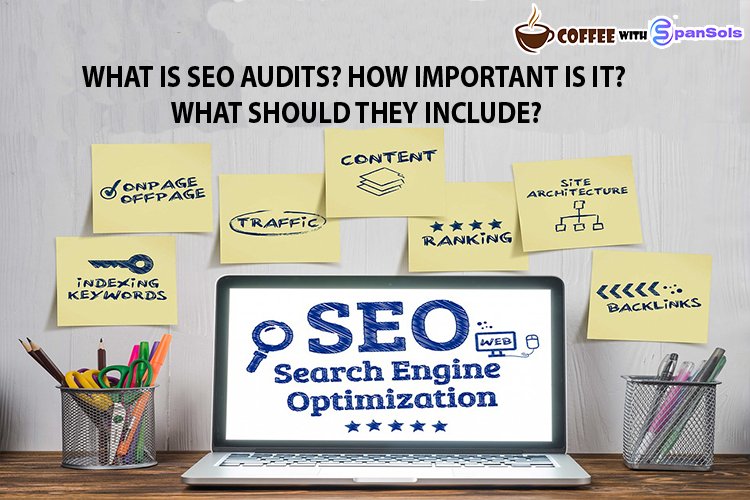What is SEO Audit? How Important is it? What Should They Include?

With the landscape for SEO in a constant state of flux, it's very easy to become caught in the furore over how to build backlinks to your site in a sustainable way, how to market your content, and how to create relationships with other sites, however the quality of the website itself often seems to be overlooked.
There's no point investing thousands in an outreach or link building campaign when there are fundamental problems with your website that could prevent it reaching its potential. It's like spending £1,000,000 on building a house on a swamp. As the old saying goes, the wise man builds his house upon the rock. Your website should be build on solid foundations that allow it to grow over time, without having to come back and hot-fix and troubleshoot constantly because all of a sudden you're not appearing in search rankings because, for some bizarre reason, your content management system is outputting 100 versions of the same page.
Ideally what you should have is a level of SEO consultancy incorporated in the construction of your site. Most web companies will tell you that they use 'SEO build principles' but this statement is fluffier than a newborn duckling - what you need is an SEO professional with you every step of the way, to ensure that things are being done correctly from the start and to make sure that you make the most of the opportunities that are available.
In many cases, due to either budget restrictions, or the fact that you just didn't realise how important this was, SEO is forgotten at the start. This is where a Comprehensive Audit comes in to its own.
What's in an SEO Audit, and how much does it cost?
This can vary massively depending on the provider and the site. An audit might be priced anywhere between £100 to £3000, but in most cases this price difference corresponds directly to the quality of the analysis, and the complexity of the task. An audit of a 5 page site shouldn't cost an arm and a leg, but similarly, don't expect to be able to get a good audit of a 5,000 page mega-site for the price of a can of beans. (this statement is subject to inflation).
In my opinion there are some fundamental points which any site review should consider:
Content
Duplicate Content
Page Hierarchy
Page Titles
Accessibility
Site Architecture
Technical Issues
Canonicalisation
URL structure
Internal Link Architecture
Backlink Profiles
Link building Opportunities
I tend to break these down in to three main categories:
On-Page Review- this is all about how we target keywords on the site, where we put them, and whether or not the pages are set up in order to leverage the most important signals to their full effect (such as the use of
and
tags, Page Titles, Image Alt Text etc)
On-Site Review - Here I look at issues which affect the whole site, rather than each page individually, this is often where serious issues are uncovered (such as problems with internal linking, duplicate content, crawler accessibility, URL structure). This tends to be the more technical part of the audit, and something which really does require a trained eye.
Backlink Analysis - Once I'm done checking out the pages of the site, then the whole site itself, I start to look at where the site is featured elsewhere on the web, namely who links to it, and how they do it. In addition to this, I build a list of desirable linking opportunities that people can either take away to a link builder, or bring back to us to action.
What makes a good audit?
Writing a good audit can be hard for anyone. It's about striking the perfect balance between providing enough information for the client to be able to understand what you're talking about, and not waffling for 200 pages. In my opinion, if you can write it in half as many words and it still makes sense, you should. Most importantly the information should be actionable and valuable, with plenty of examples.
What do you get from an audit?
An audit should essentially provide a list of actionable changes, with examples, that will put a site on the right track. It's about establishing a strong and sustainable base for your offsite and content based efforts.
How often do you need an audit?
This really depends on the site in question. If it's a small, static site that doesn't change much, the odds are you won't need one more than once every year or so, with the odd health check to fix any broken links etc. If we're talking about a regularly updated site with tons of content, links, and activity, I'd say this should be done once every six months or so, with monthly health checks to make sure everything is going according to plan.
What is an SEO Audit?
SEO AUDIT
An SEO audit is the process of analyzing how well your web presence relates to best practices - it is the first step to creating an implementation plan that will have measurable results.
The purpose of the audit is to identify as many foundational issues affecting organic search performance as possible. The SEO audit will reveal:
- Technical SEO issues
- Website structure issues
- On-page SEO issues
- Potential off-site problems
- User experience issues
- Content gaps and opportunities
- Competitive marketplace insights
An audit is a standard procedure that should occur on a regular basis – It is essentially a “health check” for your website.
What an SEO Audit Should Be:
First and foremost, an audit should be comprehensive. It should cover both structural and content components affecting your SEO visibility. It should provide a “big picture” view of what is happening in your current state. Any missing pieces could result in unnecessary or improper recommendations.
Your audit should be easy to understand. As a business owner, you should be able to connect the dots as to how SEO issues are affecting your online priorities, goals, or revenue. Any and all recommendations should clearly ladder up to your over-arching business objectives.
Finally, your SEO audit recommendations should be actionable. There should be a clear path to completion; prioritized with projected impact and effort associated with each recommendation. The output of any SEO audit should accurately convey an easy to follow roadmap.
What an SEO Audit Should Not Be:
An SEO audit should not be rushed. It simply takes time to uncover root causes of the issues affecting your online health. Depending on the size of your site, a proper audit can take anywhere from 2-6 weeks to complete. Due diligence is required when making major changes to any website, and an SEO specialist must conduct a thorough investigation to make accurate, impactful recommendations.
An SEO audit should not be “one size fits all”. While some technical elements are required for all websites, a situational analysis should be performed at the outset of an SEO audit to hone in on areas of focus for that site.
What Is Analyzed in an SEO Audit:
While SEO audits may vary slightly, each one should analyze basic technical SEO “table stakes” such as sitemaps, server errors, and metadata. At a high level, an audit should cover off on accessibility, indexation, and optimization.
In an SEO audit at Three Deep, our experts analyze over 193 different SEO elements across the following categories:
- Technical Audit
- Indexation analysis
- Status Codes
- Redirects
- Page Speed
- URL Structure
- Robots.txt
- XML Sitemap
- Canonical Tags
- Duplication
- Crawlability
- Legacy Domain Issues
- Off-page Analysis
- Mobile SEO analysis
- International SEO analysis
- On-Page Audit
- Site Content Structure
- Keyword Research
- Page Copy Theme Analysis
- Keyword Use
- Meta Data Analysis (Page Titles, Meta Descriptions, Heading Tags)
- Schema
- User Experience
- Images & Video
- Internal Linking & HTML Sitemap
- Server Log Audit
- Crawl Budget Analysis
- User Agent Analysis
The information captured during the auditing process allows our team to make accurate, impactful recommendations for your specific website and situation.
What to Expect During and After an SEO Audit:
As previously mentioned, an SEO audit can take anywhere from 2 to 6 weeks. During this time an SEO specialist is analyzing and uncovering SEO opportunities on your website. However, bi-weekly or weekly check-ins keep you and your team in the loop as to the progress.
In any given website audit, there are a few low-hanging opportunities discovered. When these types of insights are unearthed, our team will pass them along right away. This provides an opportunity to recover visibility while the remainder of the audit is carried out.
After the audit has been completed, your team will be invited to a presentation in which your SEO specialist will talk through the findings and recommendations. The Three Deep SEO team will walk you and your team though the roadmap to completion so you know what to expect and when. In addition, you will receive a comprehensive analysis of your site’s health. All of these are customized to you and your specific situation.
Why It’s Important to Audit Your Website on a Regular Basis:
Your website is the “hub” of your online brand – so, it’s important to have regular checkups to ensure everything is in order. It’s also important to note that your website is a living digital property, it’s typically not stagnant for long periods of time. In any given year, content is added and/or removed from your site. It is for this reason that audits should occur on a regular basis. We recommend that websites be audited at a minimum of once per year. That allows your teams to fix critical issues as they arise.
There are other parts of SEO which you should pay attention to after your audit to make sure you stay competitive. After all, the technical foundation isn't the end of the road for SEO success. It's important to pay attention to your competition's SEO activity, keep an eye on the newest search engine best practices, and maintain local SEO best practices if your business depends on customers visiting a physical address. All of these are elements of a successful SEO strategy and should be corollary to your audit and ongoing SEO maintenance.
Is it time for your website to get an SEO health check? If so, contact our team of SEO experts today to get one scheduled.





























